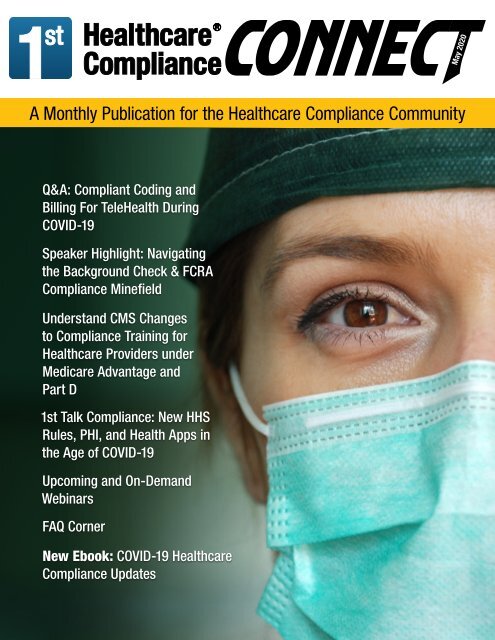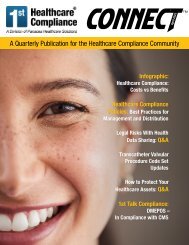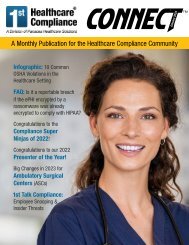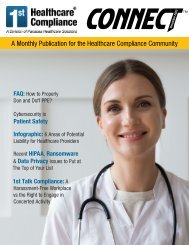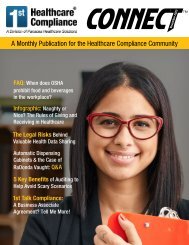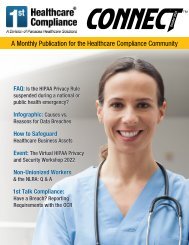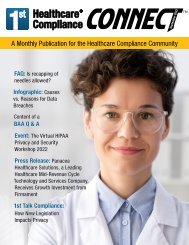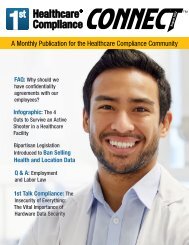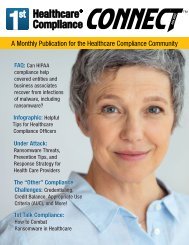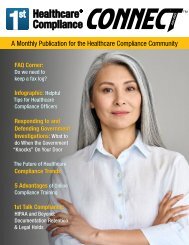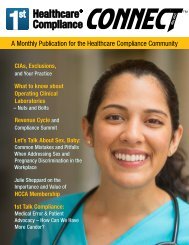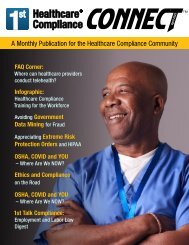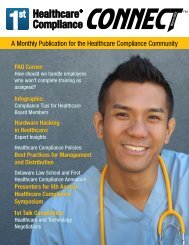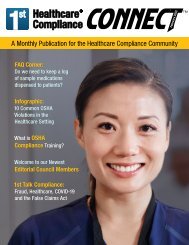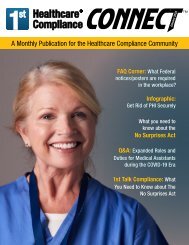First Healthcare Compliance CONNECT May 2020
Create successful ePaper yourself
Turn your PDF publications into a flip-book with our unique Google optimized e-Paper software.
<strong>CONNECT</strong><br />
<strong>May</strong> <strong>2020</strong><br />
A Monthly Publication for the <strong>Healthcare</strong> <strong>Compliance</strong> Community<br />
Q&A: Compliant Coding and<br />
Billing For TeleHealth During<br />
COVID-19<br />
Speaker Highlight: Navigating<br />
the Background Check & FCRA<br />
<strong>Compliance</strong> Minefield<br />
Understand CMS Changes<br />
to <strong>Compliance</strong> Training for<br />
<strong>Healthcare</strong> Providers under<br />
Medicare Advantage and<br />
Part D<br />
1st Talk <strong>Compliance</strong>: New HHS<br />
Rules, PHI, and Health Apps in<br />
the Age of COVID-19<br />
Upcoming and On-Demand<br />
Webinars<br />
FAQ Corner<br />
New Ebook: COVID-19 <strong>Healthcare</strong><br />
<strong>Compliance</strong> Updates
Got a Minute? Please Rate Us!<br />
The health of our company depends on the<br />
members of our community spreading the<br />
word about us.<br />
Share Your Success Story<br />
An endorsement by you is the greatest compliment we<br />
could receive! Please take a moment of your time to rate<br />
us online so that others can benefit from your experience.<br />
It’s a simple way to help us grow and improve.<br />
We appreciate your support and look forward<br />
to hearing from you!<br />
In This Issue:<br />
FAQ Corner<br />
Q&A: Compliant Coding and Billing For TeleHealth During COVID-19<br />
Speaker Highlight: Navigating the Background Check & FCRA <strong>Compliance</strong> Minefield<br />
2<br />
<strong>First</strong> <strong>Healthcare</strong> <strong>Compliance</strong>, LLC © <strong>2020</strong>
<strong>Compliance</strong> Super Ninja <br />
Marie Stinson<br />
Office Manager at Providence Pediatrics<br />
Client of our Private Practice Solution since 2018<br />
COVID-19 <strong>Healthcare</strong><br />
<strong>Compliance</strong> Updates<br />
MAY<br />
<strong>2020</strong><br />
In response to the global outbreak of the novel coronavirus disease<br />
(COVID-19), the Secretary of Health and Human Services<br />
declared a public health emergency on January 31, <strong>2020</strong>.<br />
Federal agencies have taken action by issuing updates<br />
and guidance to navigate the crisis.<br />
This ebook provides healthcare providers with important developments<br />
and resources that impact federal healthcare laws.<br />
DOWNLOAD NOW<br />
Understand CMS Changes to <strong>Compliance</strong> Training for<br />
<strong>Healthcare</strong> Providers under Medicare Advantage and Part D<br />
1st Talk <strong>Compliance</strong>: New HHS Rules, PHI, and Health Apps<br />
in the Age of COVID-19<br />
Upcoming and On-Demand Webinars<br />
Contact Toll Free: 888-54-FIRST 3
FAQ Corner<br />
How does the Families <strong>First</strong> Coronavirus Response Act Impact<br />
<strong>Healthcare</strong> Providers?<br />
On March 18, <strong>2020</strong>, the Families <strong>First</strong> Coronavirus Response Act (FFCRA) was signed into law in response to<br />
COVID-19, and took effect on April 1, <strong>2020</strong>. The FFCRA provides paid leave to eligible employees through the<br />
creation of the Emergency Paid Sick Leave Act (EPSLA) and the Emergency Family and Medical Leave Expansion<br />
Act (EFMLA). Employers may exclude health care providers and emergency responders from the FFCRA and the<br />
Department of Labor (DOL) has issued guidance defining these terms broadly.<br />
Health Care Provider Exemption<br />
For purposes of exempting employees from coverage under FFCRA, a health care provider is defined as anyone<br />
employed at any of the following entities:<br />
• doctor’s office<br />
• hospital<br />
• health care center<br />
• clinic<br />
• post-secondary educational institution offering health care<br />
instruction<br />
• medical school<br />
• local health department or agency<br />
• nursing facility<br />
• retirement facility<br />
• nursing home<br />
• home health care provider<br />
• any facility that performs laboratory or medical testing<br />
• pharmacy<br />
• any similar institution, employer, or entity (this includes any permanent or temporary institution, facility, location,<br />
or site where medical services are provided that are similar to such institutions)<br />
• individuals employed by an entity that contracts with any of the listed entities to provide services or to maintain<br />
the operation of the facility; this also includes employees of any entities that provide medical services, produces<br />
medical products, or is otherwise involved in the making of COVID-19 related medical equipment, tests, drugs,<br />
vaccines, diagnostic vehicles, or treatments<br />
• any individual that the highest official of a state, the District of Columbia, or a territory determines is a health<br />
care provider necessary for its response to COVID-19<br />
4<br />
<strong>First</strong> <strong>Healthcare</strong> <strong>Compliance</strong>, LLC © <strong>2020</strong>
Emergency Responder Exemption<br />
For purposes of exempting employees from coverage under FFCRA, an emergency responder is defined as anyone<br />
who is necessary for the provision of transport, care, health care, comfort, and nutrition of patients, or others needed<br />
for the response to COVID-19. This includes, but is not limited to:<br />
• emergency medical services personnel<br />
• physicians<br />
• nurses<br />
• public health personnel<br />
• emergency medical technicians, paramedics<br />
• emergency management personnel<br />
• military or national guard, law enforcement officers, correctional institution personnel, fire fighters, 911<br />
operators, child welfare workers and service providers, public works personnel<br />
• any individual whom the highest official of a State or territory, including the District of Columbia, determines<br />
is an emergency responder necessary for that State’s or territory’s or the District of Columbia’s response to<br />
COVID-19<br />
In order to minimize the spread of COVID-19, the DOL encourages employers to be judicious when deciding whether<br />
to exempt health care providers and emergency responders from FFCRA. For example, DOL notes that an employer<br />
may decide to exempt these employees from leave for caring for a family member, but choose to provide them paid<br />
sick leave in the case of their own COVID-19 illness.<br />
Explore the FAQs tab in your compliance solution<br />
to find answers to your compliance questions!<br />
CLIENT<br />
ALERT<br />
Navigating Workplace Violence<br />
Prevention Under OSHA<br />
Workplace violence is a serious issue, especially in healthcare facilities. In 2013<br />
alone, over 25,000 occupational assault injuries occurred, most of which were<br />
in the health care and social services industries. The Occupational Safety and<br />
Health Administration (OSHA) responded in 2015 by updating and publishing<br />
their guidelines on how to best prevent workplace violence. The OSHA workplace<br />
violence prevention guidelines help employees and employers alike by providing<br />
the necessary steps to maintain a safe work environment.<br />
DOWNLOAD NOW<br />
Contact Toll Free: 888-54-FIRST 5
Q&A: Compliant Coding and Billing<br />
For TeleHealth During COVID-19<br />
By Catherine Short<br />
Sonal Patel, Health Care Coder and<br />
<strong>Compliance</strong> Consultant for Nexsen<br />
Pruet, recently presented the webinar<br />
“Compliant Coding & Billing For<br />
TeleHealth During COVID-19” which<br />
can now be viewed here. Sonal<br />
returned to answer many commonly<br />
asked questions in relation to this<br />
presentation.<br />
When are these codes good for billing purposes<br />
during this pandemic and do you recommend I<br />
hold my claims?<br />
According to the April 6, <strong>2020</strong> published Interim Final Rule,<br />
the applicability date for these regulations is March 1, <strong>2020</strong>.<br />
So yes, I hope you have held claims since then because<br />
there has been so much confusion due to misinformation,<br />
as well as conflicting information during these past few<br />
weeks. I would advise understanding your practice’s<br />
payor mix and their policies on telehealth. There are also<br />
vast differences in commercial payor guidelines so you<br />
must perform your due diligence and research. Medicaid<br />
individual state policies also need to be understood before<br />
proper coding and billing can occur.<br />
Do you know if CMS will have audits later?<br />
Post-payment audits post-Covid-19 most certainly will<br />
occur. Certain elements of telehealth, virtual check-ins, and<br />
e-visits may be waived temporarily and CMS has stated<br />
they will not be auditing those specific elements, but<br />
everything else is up for review. This unprecedented time<br />
in our history has opened up telehealth to everyone and<br />
auditors still need to be mindful of fraud, waste, and abuse.<br />
What is HIPAA compliant in normal times for<br />
telehealth technologies?<br />
Applications for smartphones, iPads, iPads, laptops,<br />
desktops that are HIPAA compliant without the imposition<br />
of a global-now-national pandemic like COVID-19, include<br />
items you may need to purchase like Skype Business.<br />
Microsoft does give physicians a Business Associate<br />
Agreement (BAA) if they want to use this HIPAA-compliant<br />
platform. However, patients must also have an Office365<br />
account linked to the cloud-based Skype Business service.<br />
Can you tell us about any hospital waivers or<br />
relaxations for telehealth services in those<br />
locations?<br />
Although my webinar focused on Medicare Part B, there<br />
are certainly waivers and relaxations that were recently<br />
released on March 30, <strong>2020</strong> for Medicare Part A. These<br />
6<br />
<strong>First</strong> <strong>Healthcare</strong> <strong>Compliance</strong>, LLC © <strong>2020</strong>
allow hospitals and healthcare systems to deliver services<br />
at other community-based locations to make room for<br />
COVID-19 patients needing acute care in their main<br />
facilities. The changes complement and augment the<br />
work of the Federal Emergency Management Agency<br />
(FEMA) and state and local public health authorities by<br />
empowering hospitals and healthcare systems to rapidly<br />
expand treatment capacity and separate infected from<br />
uninfected patients. CMS’s waivers and flexibilities will<br />
permit patients to be triaged to a variety of communitybased<br />
locales, including ambulatory surgery centers,<br />
inpatient rehabilitation hospitals, hotels, and dormitories.<br />
Transferring uninfected patients will help hospital staff to<br />
focus on the most critical COVID-19 patients, maintain<br />
infection control protocols, and conserve personal<br />
protective equipment (PPE).<br />
Be sure to view a replay of Sonal’s webinar Compliant<br />
Coding & Billing For TeleHealth During COVID-19. Be sure<br />
to also check out our other COVID-19 webinars on this<br />
blog article as well as our on-demand webinars in our<br />
shopping cart as part of our online compliance training<br />
courses.<br />
Sonal Patel CPMA, CPC, CMC, ICD-10-CM is a healthcare<br />
coding and compliance consultant at the law firm of<br />
Nexsen Pruett, LLC. She has over 10 years of experience<br />
in multi-specialty healthcare coding and auditing. She<br />
provides reimbursement investigations for both Parts A<br />
and B providers. Patel provides healthcare lawyers with<br />
strategies and analyses to overturn denials with private<br />
and government payors.<br />
HIPAA Privacy and Security<br />
This book provides an easy-to-understand<br />
overview of HIPAA and how it impacts<br />
healthcare companies and their employees.<br />
BUY BOOK NOW<br />
Contact Toll Free: 888-54-FIRST 7
Speaker Highlight: Navigating<br />
the Background Check & FCRA<br />
<strong>Compliance</strong> Minefield<br />
By Catherine Short<br />
Catherine Walters, Partner at Bybel<br />
Rutledge LLP led the presentation,<br />
Navigating the Background Check<br />
and FCRA <strong>Compliance</strong> Minefield at the<br />
<strong>Healthcare</strong> <strong>Compliance</strong> Symposium <strong>2020</strong><br />
on April 23, <strong>2020</strong>.<br />
Catherine E. Walters provides exclusive management-side<br />
labor and employment services for employers of all sizes,<br />
including privately and publicly held companies, government<br />
contractors, institutions of higher education, health<br />
care providers, trade associations and other non-profit<br />
organizations.<br />
She focuses on identifying current and emerging trends in<br />
order to provide clients with proactive legal advice aimed at<br />
managing and preventing emerging risks.<br />
Her emphasis on strategic thinking and focused solutions<br />
enables her to provide employers with the sophisticated<br />
counsel that has become necessary in today’s complex<br />
business environment. Catherine regularly appears before<br />
federal and state courts and administrative agencies where<br />
she handles both employment and traditional labor matters.<br />
Her practice spans an array of industries, including financial<br />
and banking, manufacturing, defense contracting, education,<br />
health care, professional services, insurance, construction,<br />
technology, retail, real estate, transportation, restaurant and<br />
hospitality.<br />
Catherine’s extensive experience and collaborative skills<br />
enable her to partner with her clients to develop creative,<br />
practical, business-oriented solutions to their legal<br />
challenges.<br />
8<br />
<strong>First</strong> <strong>Healthcare</strong> <strong>Compliance</strong>, LLC © <strong>2020</strong>
The most comprehensive<br />
healthcare compliance course<br />
The Fundamentals is a user-friendly, four-module online course designed to help healthcare professionals<br />
understand the essential principles and practices of compliance.<br />
Written by our “dream team” of healthcare providers and attorneys, The Fundamentals course is packed<br />
with useful, easy-to-understand information that covers HIPAA, OSHA, employment law and enforcement of<br />
federal healthcare laws.<br />
The course takes less than four hours to complete, and the modules can be viewed in any order. A certificate<br />
of course completion is provided following successful completion of the online course and exam.<br />
The <strong>Compliance</strong> Certification Board (CCB)® has approved this event for up to 4.0 nonlive CCB CEUs. Continuing<br />
Education Units are awarded based on individual attendance records. Granting of prior approval in no way<br />
constitutes endorsement by CCB of this event content or of the event sponsor.<br />
Buy Course Today<br />
Contact Toll Free: 888-54-FIRST 9
Understand CMS<br />
Changes to <strong>Compliance</strong><br />
Training for <strong>Healthcare</strong><br />
Providers under Medicare<br />
Advantage and Part D<br />
By Sheba Vine, JD, CPCO<br />
Establishing and maintaining a well-designed compliance<br />
program is key to preventing, detecting, and mitigating<br />
noncompliance. The seven elements of an effective<br />
compliance program outlined in the Federal Sentencing<br />
Guidelines, sets the framework but there are additional<br />
requirements that need to be integrated into the<br />
compliance program in order to be effective. The Centers<br />
for Medicare & Medicaid Services (“CMS”) requires<br />
Medicare Advantage (Part C) plan sponsors and Medicare<br />
Prescription Drug (Part D) plan sponsors to follow certain<br />
compliance program requirements as part of their<br />
contract. Plan sponsors are responsible for ensuring <strong>First</strong><br />
Tier, Downstream and Related Entities (FDR), such as<br />
participating healthcare providers, also comply with these<br />
program requirements.<br />
• <strong>First</strong> Tier Entity – A party that enters into a written<br />
arrangement with a Medicare Advantage Organization<br />
or Part D plan sponsor or applicant to provide<br />
administrative services or health care services to a<br />
Medicare-eligible individual.<br />
• Downstream Entity – A party that enters into a<br />
written arrangement with a <strong>First</strong> Tier entity for the<br />
provision of administrative services or health care<br />
services to a Medicare eligible individual.<br />
• Related Entity – An entity that is related to a<br />
Medicare Advantage Organization or Part D sponsor<br />
by common ownership or control and 1) performs<br />
management functions under contract or delegation,<br />
2) furnishes services to Medicare enrollees under<br />
an oral or written agreement, or 3) leases real<br />
property or sells materials to the Medicare Advantage<br />
Organization or Part D plan sponsor at a cost of more<br />
than $2,500 during a contract period.<br />
As a result of the FDR relationship, many healthcare<br />
providers must submit attestations and/or certifications of<br />
compliance to their third-party payors as evidence of their<br />
compliance efforts. However, as of January 1, 2019, CMS<br />
updated its compliance requirements to no longer require<br />
healthcare providers participating in Medicare Advantage<br />
10<br />
<strong>First</strong> <strong>Healthcare</strong> <strong>Compliance</strong>, LLC © <strong>2020</strong>
and Part D to complete CMS issued web-based general<br />
compliance training and fraud, waste, and abuse training.<br />
This change arises from providers being subjected to<br />
multiple plan sponsors training program requirements,<br />
creating administrative burden and inefficiencies in the<br />
compliance program training and education element.<br />
According to CMS “[plan sponsor] compliance programs<br />
are very well established and have grown more<br />
sophisticated since their inception,” allowing them to<br />
remove this requirement.<br />
Plan sponsors are still required to develop an effective<br />
oversight structure for their FDRs and must continue to<br />
monitor and audit FDRs. While CMS removed the use<br />
of CMS developed training requirements, plan sponsors<br />
have discretion to include their own compliance program<br />
training requirement as part of their contracts with<br />
FDRs. Therefore, FDRs, such as healthcare providers,<br />
must review their plan sponsor contracts to determine if<br />
they must continue using CMS training materials or are<br />
subject to modified compliance training requirements. For<br />
healthcare providers that continue to use CMS training<br />
materials, note that CMS updated its general compliance<br />
and fraud, waste, and abuse web-based online courses<br />
within its Medical Learning Network as of April <strong>2020</strong>.<br />
Incorporating appropriate software tools into your<br />
compliance strategy will help streamline processes<br />
and serve as your first line of defense against these<br />
significant risks areas. <strong>First</strong> <strong>Healthcare</strong> <strong>Compliance</strong>’s<br />
cloud-based software offers solutions to fit your<br />
organization. Contact us today for a quick demonstration<br />
of our compliance management software solution.<br />
Contact Toll Free: 888-54-FIRST 11
hosted by Catherine Short<br />
Catherine Short converses with Rachel V. Rose, JD, MBA, principal with Rachel V. Rose – Attorney at Law, P.L.L.C.,<br />
Houston, TX, on the topic of “New HHS Rules, PHI, and Health Apps in the Age of COVID-19.” On March 9, <strong>2020</strong>,<br />
HHS announced the promulgation of two final rules – the ONC Final Rule and the CMS Final Rule. The purpose is to<br />
expand an individual patient’s control over their health data. It requires insurance plans to share health data with their<br />
patients in a format suitable for their phones or other device of choice. How does this impact provider liability in light of<br />
the <strong>Healthcare</strong> Apps Guidance issued by HHS? During this program, Rachel will explain the two new final rules, as well<br />
as the potential impact on providers; review the <strong>Healthcare</strong> Apps Guidance, which relates to HIPAA liability; and provide<br />
suggestions for integrating the new rules while continuing to strive towards HIPAA compliance.<br />
Listen weekdays at<br />
7:30am, 3:30pm, 11:30pm ET<br />
Check out our Show Page!<br />
Looking for the latest compliance insights?<br />
Subscribe to our feed and don’t miss a thing!<br />
12<br />
<strong>First</strong> <strong>Healthcare</strong> <strong>Compliance</strong>, LLC © <strong>2020</strong>
WORD SEARCH<br />
B H E F K E W T E L E H E A L T H S H M<br />
N A X S P M E C N E I R E P X E L K T K<br />
J M C G T X C G E V W T N A I L P M O C<br />
L L O C B Z P F R R M I K J D N P G Q Z<br />
A V R A Z H F U F M T K N E Q Q H L M A<br />
Q R O E T R W M W G T I F S R C B U L U<br />
Z V N E R N N M U Y N E F Q U Z X N B J<br />
E W A U V A Q Q J S E G U I G R R W Q Q<br />
V J V X C I C R B B I N U M C E A V P C<br />
M Y I Y M B S H M N T K Q N M A T N I O<br />
E R R Q B R B N T O A X J E M X T M C W<br />
D X U O R B G D E L P S R G W H E I V E<br />
I B S W T S I T M H A G L M A D M K O C<br />
C Y R T F A F L H U E E V H N K V V W N<br />
A S K N C T R Q Y N A R H A Y G K Y J A<br />
R K Q I G X A O C E F C P L D Z X B D D<br />
E S D Y D M F Y B T B P T M W L N G O I<br />
B E O U W J D P E A B L F O O T A W A U<br />
M W A J K M N K G S L G H J U C O T V G<br />
B K A I V O N H P I C M P K B S V J U M<br />
CORONAVIRUS HEALTHCARE LABORATORY<br />
COMPLIANT TELEHEALTH PANDEMIC<br />
MEDICAID MEDICARE EMERGENCY<br />
INSURANCE COMPREHENSIVE EXPERIENCE<br />
CERTIFICATION GUIDANCE PATIENT<br />
Contact Toll Free: 888-54-FIRST 13
Upcoming and On-Demand Webinars<br />
Training<br />
MAY 27, <strong>2020</strong> Medical Debt: The Good, The Bad and The Ugly Register<br />
ON DEMAND:<br />
ON DEMAND:<br />
ON DEMAND:<br />
ON DEMAND:<br />
HHS Final Rules, Patient Access to PHI & Health Apps Intersect<br />
Aerosol Transmissible Disease Standard (ATD) using California<br />
Standards as a Model<br />
Funding in the Time of COVID-19<br />
Compliant Coding & Billing For TeleHealth During COVID-19<br />
Full Webinar List<br />
NEW TRAINING ZONE FEATURES!<br />
CLIENT<br />
ALERT<br />
Use the following feature to assign all unassigned training and to<br />
set the duration period for employee training:<br />
30 days Assign All<br />
Use this feature to assign training automatically each year on a specific date<br />
and to set the duration period for employee training.<br />
Schedule Automatic Assignments<br />
Join us on Social Media!<br />
Contact our Client Services Team with your questions!<br />
888.54.FIRST or clientservices@1sthcc.com<br />
14<br />
<strong>First</strong> <strong>Healthcare</strong> <strong>Compliance</strong>, LLC © <strong>2020</strong>


